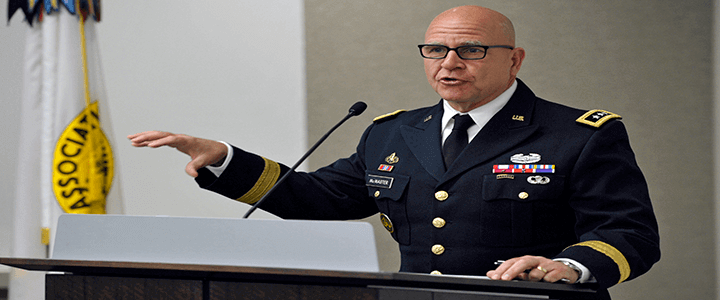Given the events of the last week, and the nation’s descent once again into fits of tribalism, you could be forgiven for missing a key administration document released last week. In conjunction with the Senate Select Committee on Intelligence’s annual hearing on threats, held last Tuesday, the Office of the Director of National Intelligence released the intelligence community’s annual threat assessment.
The document is yet another counterargument to those who say the Trump administration is “soft” on Russia.
McMaster continues to build his empire
Word in Washington is that Lt. Gen. H.R. McMaster, the national security adviser, is (still) on thin ice with the president. Multiple outlets reported Thursday that the Pentagon is looking for a suitable four-star billet for McMaster. This would allow him to leave the West Wing and have the move be a promotion.
Although White House spokesman Sarah Sanders says that McMaster still enjoy’s the president’s confidence, the President did deliver somewhat of a rebuke to McMaster last week. Speaking at a security conference in Germany, McMaster said that given Robert Mueller’s indictments handed down Friday, it is “now really incontrovertible” that Russia attempted to sway the 2016 presidential election.
The president, in a Tweet, pointed out that the general forgot to add that the indictments showed no signs of collusion. Sanders said the two statements are not contradictory, just that the president thought McMaster should have included more information. But rightly or wrongly, those who traffic in palace intrigue are saying the exchange sets McMaster up for a fall.
But regardless of what happens to McMaster himself in the coming weeks or months, the McMaster Doctrine — the return of great-power competition played-out across multiple new domains of warfare — is established policy and cannot be quickly undone. The DNI’s threat assessment is another element of that doctrine.
russia is “the most capable and aggressive” info threat
Speaking on NPR Thursday night, President Obama’s ambassador to Russia, Mike McFaul, surprised the hosts by saying what we’ve been saying here since December: when it comes to actual policies, the Trump administration is continuing the policies of the Obama administration, not weakening them. The DNI’s threat assessment is further proof.
There’s plenty of mention of Russia and China, our two other great-power competitors. But this year’s threat assessment specifically continues the previous administration’s assessment that Russia did in fact meddle in the election. The document contains a page on “counterintelligence and foreign detail and deception” that takes direct aim at the Russian government.
The document says that Russia is probably “the most capable and aggressive source” of the threat of influence operations. It says that Moscow will “continue using propaganda, social media, false-flag personas, sympathetic spokespeople, and other means of influence to try to exacerbate social and political fissures in the United States,” particularly leading up to November’s mid-term Congressional elections.
So it bears repeating: Tweets are not policy. The president bristles at the idea that Russian internet trolls posed as Americans to hurt Hillary Clinton and help him. But that doesn’t change the fact that they certainly tried. Their degree of effectiveness is largely up for debate. I personally do not see how many votes swung one way or the other based on what the Russians were feeding us. It did, however, undermine our faith in our government, the media, and even in each other.
“Moscow seeks to create wedges that reduce trust and confidence in democratic processes, degrade democratization efforts, weaken US partnerships with European allies, undermine Western sanctions, encourage anti-US political views, and counter efforts to bring Ukraine and other former Soviet states into European institutions,” according to the ODNI.
On that count, they appear to have accomplished their mission.




